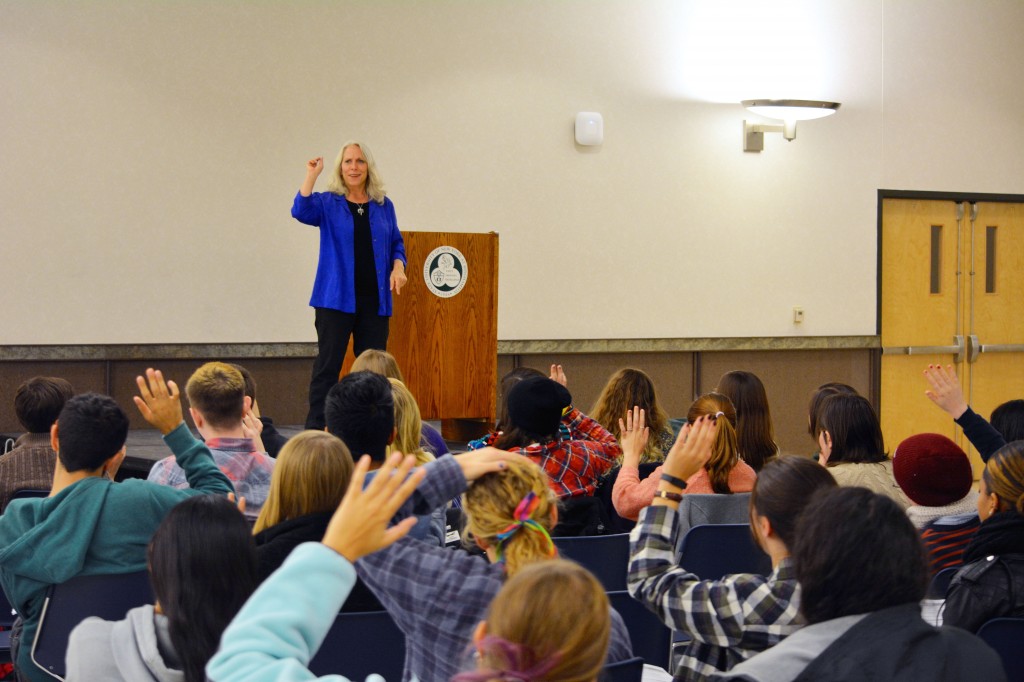
Bisexual activist Robyn Ochs spoke in the Old Union Hall Monday evening about gender identities and sexuality. Highlighting misconceptions of both gender and sexual orientation, Ochs brought to light just how complicated identity is.
Ochs’ program covered many facets of gender identity and sexuality. She made a point to show the fluidity between the two by getting the audience involved in a workshop where everyone anonymously placed their sexuality, gender expression and gender conformity on a spectrum.
“Identity is subjective and they don’t all mean the same thing to each person,” Ochs said. “If you don’t fit neatly on the line, find a place off the line.”
Ochs is an outspoken advocate of LGBTQ rights serving on the board of MassEquality, a Massachusetts organization advocating marriage equality and other LGBTQ rights. She has written a pair of anthologies including her work, “Getting Bi” and has won multiple awards including the Harvard Gay & Lesbian Caucus Lifetime Achievement Award in 2009.
In her talk, Ochs expressed her dissatisfaction with the Kinsey Scale, a linear measurement of sexuality from zero to six, and other past models of sexuality.
“The models of sexuality are flawed because they rest on the assumption of two genders,” Ochs said. “Male and female are not opposites but variations on the same theme.”
Understanding the dichotomy of gender and sex is both diverse and subjective. According to Ochs, American culture tends to use gender and sex interchangeably when in actuality, they have very different meanings.
“Sex is between your legs,” Ochs said. “Gender is between your ears.”
Joseph Dibenebetto, a sophomore majoring in sociology, said he found Ochs’ version of measuring sexuality interesting.
“I thought it was mind-boggling how she modified the scale and made it her own adding gender to the spectrum,” Dibenebetto said.
A good portion of Ochs’ lecture was spent talking about the complicated nature of identities. According to Ochs, we all have multiple identities in which we categorize ourselves. There is also a difference between how people identify themselves and their perception of how others view them. These identities often overlap and effect one another.
“Intersectionality is how all of our identities affect our experiences of the other identities,” Ochs explained. “Real people get lost and we don’t see them as they are. Our identities can be stories, not just words.”
Ochs also focused on the concept of sexual orientation and her opinions of how American culture addresses it. She explained that in the U.S., when a person thinks about sexual orientation, they often think about genitals. However, she says that this is wrong.
“I think that’s stupid and reductive,” Ochs said. “There is so much more to attraction.”
She then got the audience involved and asked them what factors made them attracted to somebody besides aesthetics. The audience subsequently responded with answers like “intelligence,” “humor” and “kindness.” According to Ochs, attraction doesn’t always have to be sexual.
“Attraction itself is complicated,” she said. “You can be attracted to someone and might not always want to put your hands down their pants. Attraction is irrational.”
Ochs made it clear just how intricate and complicated the gender and sexuality spectrums are. According to her, there is no one answer or way to categorize a human being and self-identity is often a process that is always evolving.
“The more complex the … language, the more close to reality we can get,” Ochs said.


